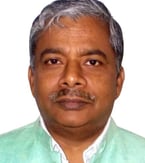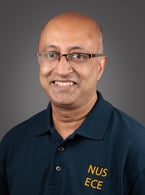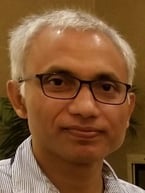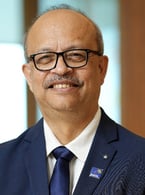Keynote Speakers


From Smart Sensing to Smart Living: The Era of IoT, AI/ML and Data Science
Speaker: Prof. Sajal K. Das
IEEE Fellow Curators’ Distinguished Professor and Daniel St. Clair Endowed Chair Department of Computer Science Missouri University of Science and Technology, USA
Abstract: We live in an era in which our physical and cyber environments are becoming increasingly intertwined due to the advent of smart devices and sensors, Internet of Things (IoT), cyber-physical systems (CPS), wireless communications, pervasive computing, AI, machine learning, and data science. Alongside, smartphones are empowering the human world to interact with both physical and cyber worlds to collect fine-grained information and opinions via mobile crowdsensing about events of interest, resulting in actionable inferences and decisions. This synergy has led to the development of Smart Living CPS, the goal of which is to improve the quality of life in a variety of smart environments, such as smart homes and cities, smart grid, smart transportation, industry 4.0 and smart manufacturing, smart health, smart agriculture, and so on. However, such systems pose significant challenges due to the scale, complexity, heterogeneity, uncertainty, interdependence, resource limitations, human behavior randomness, security, privacy, and trust issues. This keynote talk will highlight unique challenges, novel frameworks, and models to design and model reliable, secure and trustworthy smart living CPS. Our innovative approaches are based on rich theoretical and practical design principles, such as AI/ML algorithms, time-series data analytics, sensor fusion, uncertainty reasoning, information theory, prospect theory, reputation/belief models, graph theory, and game theory. Real-world case studies and experimental results will be presented for smart energy, smart transportation, smart water networks, smart agriculture, and smart health applications. The talk will be concluded with directions of future research.
Biography: Dr. Sajal K. Das is a Curators’ Distinguished Professor and Daniel St. Clair Endowed Chair in Computer Science at Missouri University of Science and Technology. He is an ex-Program Director of the US National Science Foundation (NSF). His interdisciplinary research spans cyber-physical systems, IoT, UAVs, wireless sensor networks, cybersecurity, machine learning, data science, mobile and pervasive computing, smart environments, edge-cloud computing, social and biological networks, applied graph theory and game theory. He has made fundamental contributions to these areas and published extensively in top-tier venues (more than 350 journal articles and more than 450 peer-reviewed conference papers). His h-index is 102 with more than 44,500 citations according to Google Scholar. Dr. Das coauthored 60 book chapters and 4 books – Smart Environments: Technology, Protocols, and Applications; Handbook on Securing Cyber-Physical Critical Infrastructure: Foundations and Challenges; Mobile Agents in Distributed Computing and Networking; and Principles of Cyber-Physical Systems: An Interdisciplinary Approach. A holder of 5 US patents, he directed over USD $24 million funded research projects. He is the founding Editor-in-Chief of Elsevier’s Pervasive and Mobile Computing journal and serves as Associate Editor of IEEE Transactions on Sustainable Computing, IEEE Transactions on Dependable and Secure Computing, ACM Transactions on Sensor Networks, and ACM/IEEE Transactions on Networking. A founder of IEEE PerCom, WoWMoM, SMARTCOMP and ACM ICDCN conferences, he has served as General Chair and Program Chair of reputed conferences. Dr. Das is a recipient of 14 Best Paper Awards in flagship conferences like ACM MobiCom and IEEE PerCom; and numerous awards for teaching, mentoring and research including the IEEE Computer Society’s Technical Achievement award for pioneering contributions to sensor networks, and the University of Missouri System President’s Award for Sustained Career Excellence. He has mentored and graduated 12 postdoctoral fellows, 51 Ph.D. scholars, 31 MS thesis, and numerous undergraduate research students and colleagues around the world. Currently he is supervising 10 Ph.D. students and 4 postdocs. Dr. Das is a Distinguished alumnus of the Indian Institute of Science, Bangalore, and a Fellow of the IEEE, National Academy of Inventors (NAI), and Asia-Pacific Artificial Intelligence Association (AAIA).
Beyond the Base Station- Towards Decentralized Cellular Networks with D2D Communication
Speaker: Prof. Sukumar Nandi
Dean (Administration) & Professor, Department of Computer Science and Engineering, IIT Guwahati
Abstract:
In the ever-evolving landscape of Cellular networks, Device-to-Device (D2D) Communication represents a paradigm shift, enabling direct communication between proximal User Equipments (UEs) without involving Base Station. It was initially designed for public safety communication for scenarios where the traditional network infrastructure may be unavailable or damaged. Over time, it has evolved to support a wide array of use cases, such as V2X, IoT, AR-VR systems and much more. A key question for enabling D2D communication is: Are the devices close enough to communicate? This is where Device Discovery comes into play — a crucial step to determine whether devices are within each other’s communication range. In this talk, we will discuss the existing discovery models proposed by 3GPP and present our hybrid discovery model, which is designed taking into account the strengths of existing discovery models while mitigating their limitations. Further, we will explore an adaptive algorithm that adjusts the probing interval based on the relative mobility of proximal devices. In addition to this, we will delve into a network-assisted approach: a cooperative solution where adjacent base stations share neighborhood information, helping devices discover each other with less overhead. Once devices have successfully discovered each other, the subsequent challenge lies in the efficient allocation of frequency resources. In this context, we will discuss the existing resource allocation mechanisms standardized by 3GPP, discussing their limitations, and potential avenues for enhancement. The keynote will conclude with insights into future applications, open challenges, and research directions, highlighting the potential of D2D communication in shaping a decentralized and resilient next-generation of Cellular Networks.
Biography:
Professor Sukumar Nandi is a Senior Professor in the Department of Computer Science & Engineering at Indian Institute of Technology Guwahati, India. Prof. Nandi is serving as the Dean of Administration at IIT Guwahati. He has held various academic and administrative roles over the years, including Deputy Director, Dean of Academic Affairs, Dean of Infrastructure Planning and Management, Dean of Research and Development at IIT Guwahati. He was a visiting Senior Fellow at Nanyang Technological University (NTU), Singapore. He received his Ph.D. in Computer Science and Engineering from Indian Institute of Technology Kharagpur, India, in 1995. He is a Fellow of Indian National Academy of Engineering (INAE), Institution of Engineers (India), Institution of Electronics and Telecommunication Engineers (India), Asia-Pacific Artificial Intelligence Association (AAIA); and a Senior Member of IEEE and ACM. He has authored more than 500 publications, including over 136 journal articles, 367 papers in international conferences, as well as contributions to books and edited volumes. His research interests include Computer Networks, Computer and Network Security, VLSI, Computer Architecture, Machine Learning etc.




Security Challenges in AI-Driven 6G Networks
Speaker: Prof. Biplab Sikdar
Abstract: The advent of 6G networks promises unprecedented advancements in connectivity, low latency, and massive machine-type communication, setting the stage for a future where artificial intelligence (AI) will play a pivotal role in network management, automation, and optimization. However, the integration of AI into 6G networks also introduces a wide range of security challenges that need to be addressed to ensure the safe and reliable operation of these next-generation networks. This talk will explore the evolving security landscape of AI-driven 6G networks, focusing on potential threats, vulnerabilities, and mitigation strategies. Key topics include the risks of AI-powered attacks, such as adversarial machine learning, data poisoning, and model inference attacks, as well as vulnerabilities in network slicing, edge computing, and Internet of Things (IoT) devices that are expected to proliferate in 6G environments. The seminar will also discuss the importance of trust, privacy, and security in AI-based decision-making processes.
Biography: Prof. Biplab Sikdar is the Provost’s Chair Professor and Head of Department in the Department of Electrical and Computer Engineering at the National University of Singapore, where he also serves as the director of the Cisco-NUS Corporate Research Laboratory. He received the B. Tech. degree in electronics and communication engineering from North Eastern Regional Institute of Science and Technology, Nirjuli, India, in 1996, the M.Tech. degree in electrical engineering from the Indian Institute of Technology, Kanpur, India, in 1998, and the Ph.D. degree in electrical engineering from the Rensselaer Polytechnic Institute, Troy, NY, USA, in 2001. His research interests include IoT and cyber-physical system security, network security, and network performance evaluation. He is a recipient of the NSF CAREER award, the Tan Chin Tuan fellowship from NTU Singapore, the Japan Society for Promotion of Science fellowship, and the Leiv Eiriksson fellowship from the Research Council of Norway. He has served as an Associate Editor for the IEEE Transactions on Communications, IEEE Transactions on Mobile Computing, IEEE Internet of Things Journal, IEEE Open Journal of Vehicular Technology, and IEEE Network. He is an IEEE Fellow, IEEE Distinguished Lecturer, an ACM Distinguished Speaker, and member of Eta Kappa Nu and Tau Beta Pi.


Data-driven and light-weight ML aided smart IoT
Speaker: Prof. Swades De
Abstract: Massive IoT deployment for realizing smart environments heavily depends on the cost of deployment and ease of maintenance. These factors in turn depend on cost, energy efficiency, energy sustainability, and potential green operation capability. In this presentation, we will discuss how lightweight learning-aided computing at the field node nodes, at the edge, fog, and cloud can aid in achieving these goals. First, through a generic framework, we will try to capture the general principles of achieving the IoT solutions, which can be customized as per the application-specific needs. Subsequently, through a few practical use cases, we will demonstrate how we have made some progress from research-driven problems using classical applied stochastics tools to learning-aided refinement of the solutions, and finally to the development of technology prototypes. We will share our experiences from field experiments, proof-of-concept implementations, and deployments, and will highlight the possibilities of learning-aided networking optimizations for various multidisciplinary-disciplinary applications. We will round off the discussion by sharing some of the challenges that we face in further translation efforts.
Biography: Prof. Swades De (web.iitd.ac.in/~swadesd) received the B.Tech. degree in Radiophysics and Electronics from the University of Calcutta in 1993, the M.Tech. degree in Optoelectronics and Optical Communication from IIT Delhi in 1998, and the Ph.D. degree in Electrical Engineering from the State University of New York at Buffalo in 2004.
Dr. De is currently a Senior Professor with the Department of Electrical Engineering, IIT Delhi. Before joining IIT Delhi in 2007, he was a Tenure-Track Assistant Professor with the Department of ECE, New Jersey Institute of Technology, Newark, NJ, USA, from 2004–2007. He also worked as an ERCIM Post-doctoral Researcher at ISTI-CNR, Pisa, Italy (2004), and has nearly five years of industry experience in India in telecom hardware and software development from 1993–1997 and in 1999.
His research interests broadly cover communication networks, with a focus on performance modeling and analysis. His current research directions include energy-sustainable and green communications, wireless energy transfer, in-band coexistence and spectrum-sharing communications, smart grid networks, and IoT communications. Dr. De currently serves as an Associate Editor of IEEE Transactions on Wireless Communications.


Green Energy – Strategic Drivers of Sustainable Growth at NRL
Speaker: Shri Bhaskar Jyoti Phukan
Abstract: Numaligarh Refinery Limited (NRL), a Schedule-A Miniratna CPSE under the Ministry of Petroleum & Natural Gas, is actively implementing a multi-pronged green energy strategy aligned with India’s Net Zero ambitions. NRL has committed to achieving Net Zero emissions from its own operations by 2038. Among its key initiatives is a 2.4 KTPA Green Hydrogen Plant powered by 18 MW of renewable energy, scheduled for commissioning by September 2025. This project aligns with the 1:1:1 green hydrogen vision for India – that is, to make India the first country globally to achieve $1 per 1 kg in 1 decade for green hydrogen.
Parallelly, NRL is developing the world’s first bamboo-based 2G Bio-Refinery through a joint venture Assam Bio Ethanol Private Limited (ABEPL), which will produce 48,900 MT of ethanol, 19,000 MT of furfural, 11,000 MT of acetic acid, and 31,000 MT of food-grade liquid CO₂ annually. The project exemplifies circular bioeconomy principles by leveraging the Northeast’s abundant bamboo resources.
Complementing these projects are NRL’s focused investments in Carbon Capture, Utilisation and Storage (CCUS), afforestation (including a ₹2.2 crore compensatory afforestation initiative in 28 hectares in Dibrugarh), renewable energy sourcing through pumped hydro and solar, and waste-to-energy initiatives via Compressed Biogas Plants in collaboration with OIL. These green efforts are further strengthened by an MoU signed with the Indian Institute of Technology (IIT) Guwahati for translational research in automation and clean energy. NRL’s operational performance continues to lead industry benchmarks—with a distillate yield of 88.01% and Specific Energy Consumption (SEC) of 61.11 MBN in Q4 FY 2024–25. These green investments form a key part of NRL’s ₹50,000+ crore expansion and diversification roadmap, which includes the 6 MMTPA Numaligarh Refinery Expansion Project (NREP), the 1,640 km Paradip-Numaligarh crude oil pipeline, and a 360 KTPA polypropylene unit, positioning NRL as a key public sector driver of India’s clean energy transition.
Biography: Bhaskar Jyoti Phukan is Managing Director of Numaligarh Refinery Limited (NRL), a leading public sector refinery in the Northeast India under Ministry of Petroleum and Natural Gas, Government of India.
He is a Mechanical Engineer with more than 30 years of experience in the Oil Industry including Logistics, Marketing, Technical Services and Operation. He started his career in Indian Oil Corporation Ltd. (Assam Oil Division) in the year 1990 and thereafter joined Numaligarh Refinery Limited (NRL) in the year 1999. Prior to his assuming the office of the Managing Director, he held the position of Director (Technical) of NRL.
Mr. Phukan has been instrumental in strategizing the growth various upcoming projects in the area of Oil Refining, Crude Oil Transportation, Petroleum Transportation, Natural Gas Transportation, Petro Chemical projects, Investment in marginal fields etc. NRL plans around INR Rs 45,000 Crs capex in recent 5 years and these investments will make NRL a leading player in all streams of Hydrocarbon. He was one of the key persons in conceptualising and implementing the first-in-the-world 2G ethanol bio-refinery at Numaligarh which will convert bamboo to ethanol and other chemicals. Mr Phukan is an avid technology enthusiast and is a believer of early adoption of cutting-edge technology and supports start-ups ventures.
Shri Bhaskar Jyoti Phukan's forward-thinking leadership is evident in NRL's ambitious Net Zero roadmap, emphasizing the production of green hydrogen, waste ammonia recovery, and afforestation initiatives. In summary, his leadership has positioned NRL as a key player in India's energy sector, contributing significantly to the nation's energy security and environmental goals through a dynamic hybrid strategy and a clear roadmap towards achieving Net Zero Emissions by 2038.